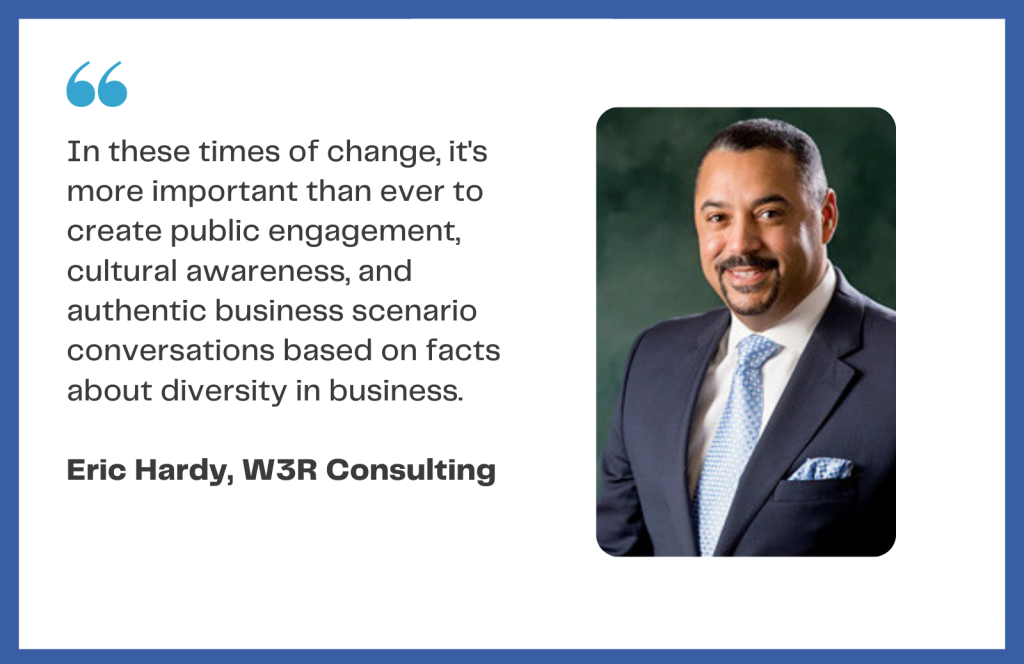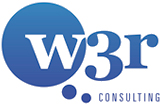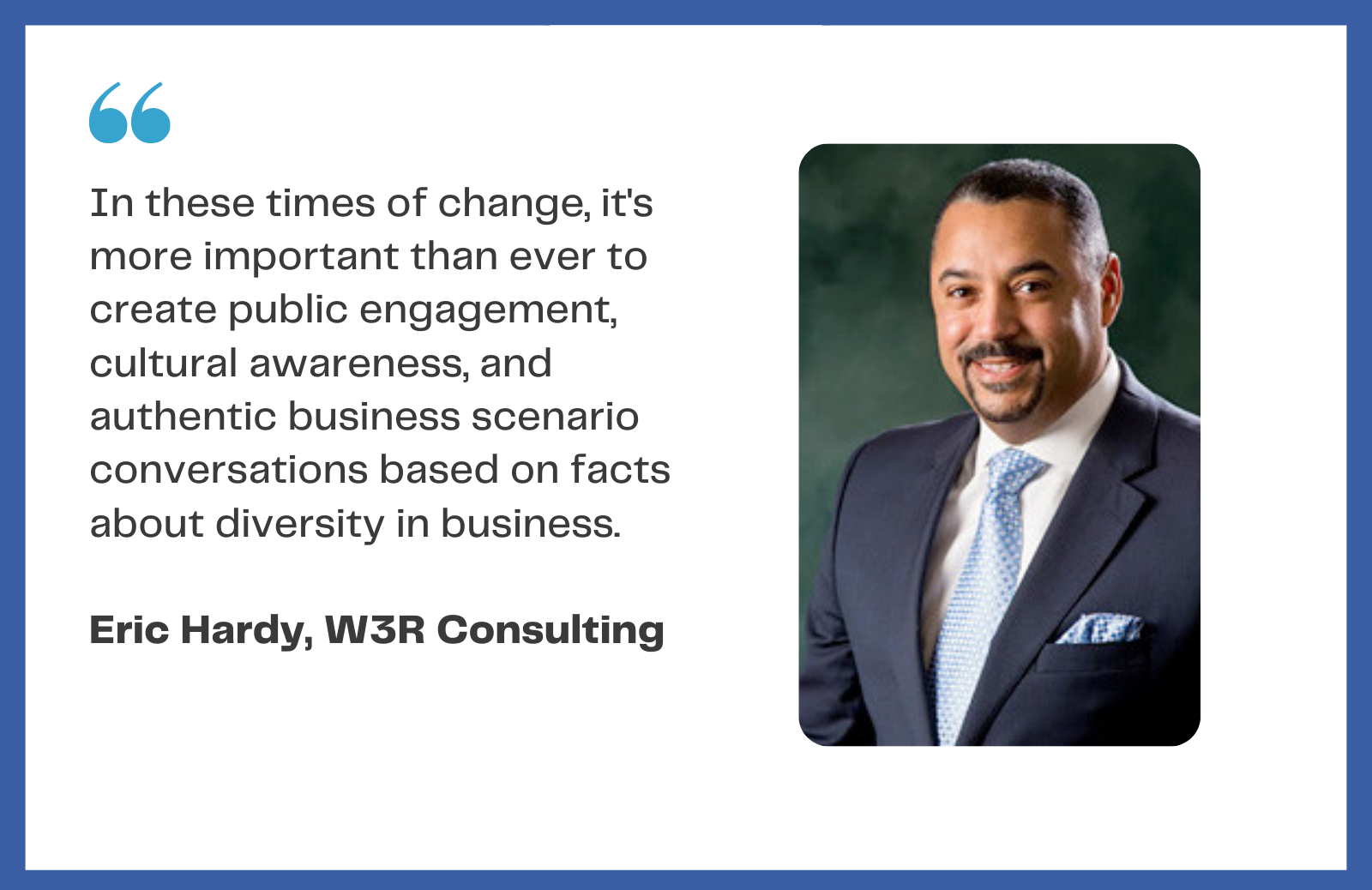w3r Consulting Discusses the Importance of Diversity in Business

In the second installment of the W3R Consulting Podcast series of the #BuyDiverse #podcast, Chicago MSDC President and CEO Vincent Williams spoke with Eric Hardy, President and CEO of W3R Consulting, and Dr. Ken Harris, National Business League President. They explored three main topics related to the importance of diversity in business for our communities and economy as we emerge out of COVID and in a post-George Floyd kind of reactionary era. (Listen to the W3R podcast in full at https://bit.ly/w3rwgnbuydiverse2)
The State of Black Business Today
Eric opened the conversation with a foundational question: “Where do you think the state of black business is today?” he asked. “Corporate leadership has certainly made some overtures, but do we think they delivered or started to deliver on promises to the community? Where do you see that going?”
After a little repartee, Dr. Harris injected the conversation with critical points and stats outlined within the African-American community, such as: 40% of black businesses have closed their doors permanently or are potentially one or two paychecks away from doing so.
“This is a discussion that is important not only because of the racial unrest with George Floyd but also because of the ratio of black inequities that have existed and continue to exist,” he explained further. “The heightened discussion surrounding black businesses has led to a focus on where they are today.”
Out of the 2.6 million black firms still open for business throughout the country today, 95% are one-employee home-based businesses, sole proprietors, or between one and three employees with no capacity to grow or even transition or pivot.
“COVID was a real wake-up call for many of these businesses who are now starting to think about how they can grow their business,” Dr. Harris stated as he closed the topic. “This new season is an opportunity for black businesses to start transitioning into larger companies that can have a positive impact on the economy.”
The Solution Revolution Explained
Eric’s next set of questions framed a great second segment that delved into organizational impact driven by real solutions.
Eric proposed to Dr. Harris: “Do you think we are really doing enough to support the smaller organizations? From the perspective of your own programming and what you’re involved in, what do you see that’s really working and resonating for the small businesses that really need our help?”
Dr. Harris poignantly highlighted what’s happening and explained the reasoning behind his coined phrase, The Solution Revolution.
“,” he said. “There’s a huge growth opportunity to focus on small business owners at this time. The differentiator between success is the deployment of resources and access to resources.
According to recent studies, the majority of the United States population will be black and brown within 10-25 years. This shift in demographics should be taken into account when planning for the future, as these groups will soon make up a significant portion of consumers. Black business owners have played a key role in fighting for civil liberties and rights for all Americans, including minorities; as such, they should be recognized and supported.
A massive shift like this presents a huge opportunity for us to hold accountability on both sides. This means that black business owners need the resources and capital necessary to obtain contracts from corporations to effectively compete in the marketplace.
“Corporations should be intentional about their commitments to black racial equity, with the goal of measuring their progress over time,” Eric stressed. “This is a unique time period for us in terms of advancing black racial equity.”
Dr. Harris’ and Eric’s discussion also called attention to an exciting new solution already in place positioned to dispel such myths. The National Business League, recently in partnership with car manufacturer Stellantis, will:
- Develop Black suppliers for future contracting and procurement opportunities and success in a post-pandemic economy.
- Create a new online virtual procurement and contracting marketplace that will build a bridge between the public and private sectors to create substantive business opportunities for Black suppliers.
- Through the marketplace portal program, will qualify, train, and develop Black businesses for future contracting opportunities.
This solution immediately addresses the statistic that fewer than 3% are minority or agency certified.
Dispelling the Myth Around the Availability of Talent within Diverse Communities.
In the final segment, Eric rounded out the conversation about the availability of talent, specifically the minority talent myth in the workforce.
Myth #1: There is not a wide pool of diverse candidates for jobs or high-value career opportunities.
Myth #2: A minority firm or a black-owned business has this Rolodex, if you will, of interested candidates across any platform, any skill set, and in any geography.
Eric explained the importance of the private and public company partnership dynamic and how these synergies must align to not only dispel these myths but actively engage in creating a pipeline of diverse talent available to all companies with more skin in the game. As the owner of a 26-year-old I.T. consulting firm, he reiterated the corporate responsibility to sincerely do the work to fill the talent gaps.
In closing, they determined that America is in a time of change, which extends to the business world as well. The economy now has an opportunity for more diverse businesses that will shape our future.
You can listen to the W3R podcast in full at https://bit.ly/w3rwgnbuydiverse2 and visit Dr. Ken Harris at http://www.nationalbusinessleague.org.
Be sure to subscribe to the #BuyDiverse podcast so you don’t miss out on great conversations with great leaders like Dr. Ken Harris who share valuable insights about today’s changing environment or how we can all contribute by supporting diversity efforts such as those championed by W3R Consulting.
Want to stay current with or have a conversation about the importance of diversity in business? Stay connected to W3R Consulting at www.w3r.com or call directly at 248-258-1002.
Related Articles
4 Lessons from w3r’s Experience That Can Guide the Next Generation of MBEs (Part 1)
4 Lessons from w3r’s Experience That Can Guide the Next Generation of MBEs (Part 2)
4 Advantages that Companies with Supplier Diversity Programs Have Over the Competition


